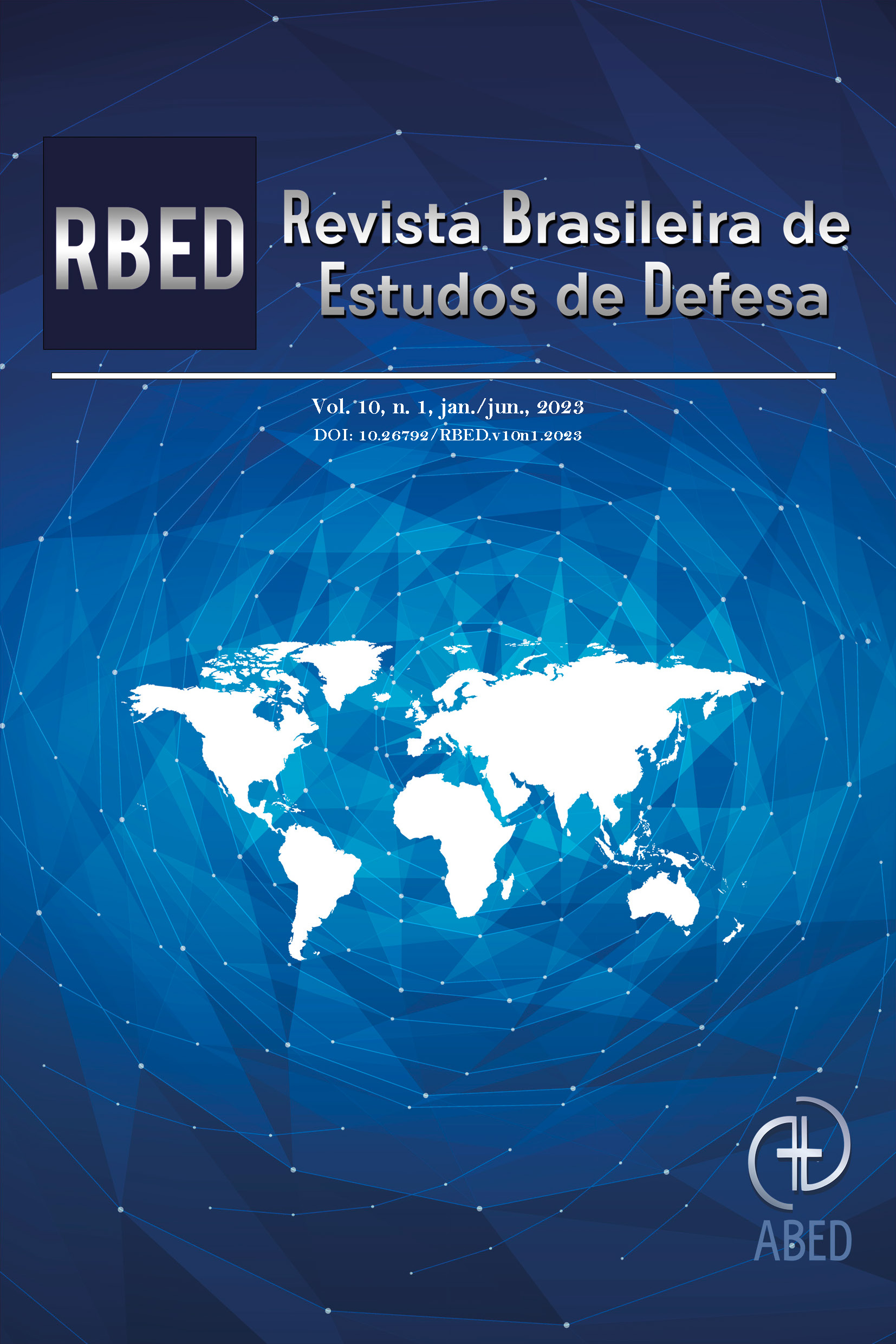A Clausewitzian Theory Analysis of the 2006 Hezbollah-Israel War
DOI:
https://doi.org/10.26792/rbed.v10i1.75302Keywords:
Hezbollah, Israel, Estratégias, Táticas, Guerra de JulhoAbstract
Is it possible to employ key precepts and concepts of the Clausewitzian theory of
war, present in On War (1989), to understand a twenty-first century war, which
occurred outside the European geographic space, in its multiple characteristics
and complexities? From this question-problem, the object of the research goes
through the Hezbollah-Israel conflict, which occurred between July and August
2006. Our hypothesis is that Clausewitz’s key concepts remain current and, despite
temporal limitations, are amenable to being employed to analyze the specificities
of this conflict in screen. Thus, as a central objective, this will be analyzed from
Clausewitz’s theoretical-conceptual prism, present in On War (1989), focusing on
the conceptions of: political objectives; limited and unlimited warfare; political,
strategic, and tactical attackers and defenders; advantage of waiting and position;
and deterrence, without the neologisms applied to war today. Drawing on historical-documentary research methods, in conjunction with case study techniques,
a historical overview is provided from the causes of the war, to how Israel and
Hezbollah developed and applied their political objectives, strategies, and tactics,
arriving, finally, at a brief final post-war assessment. It is concluded that the 2006
war, considering its specificities, transited between several Clausewitzian concepts.
Downloads
References
Crooke, Alaistair & Perry, Mark. 2006. “How Hezbollah Defeated Israel, Part 1: Winning the Intelligence War,” Asia Times Online.
Barno, David W. 2006. Challenges in Fighting a Global Insurgency. 2006. Disponível em: <http://www.carlisle.army.mil/usawc/parameters/Articles/06summer/barno.pdf>. Acesso em 31mar.2022.
Clausewitz, Carl von. 1976 On War. (Translated and edited by Michael Howard and Peter Paret). 2 ed. Princeton, New Jersey: Princeton University Press.
Daher, Aurélie. 2011. “Le Hezbollah libanais et la résistance islamique au Liban : des stratégies complémentaires”. Confluences Méditerranée, 76, no. 1, 101. Disponível em: <http://www.cairn.info/revue-confluences-mediterranee-2011-1-page-101.htm?ref=doi>. Acesso em: 29 maio 2021.
Diniz, Eugênio. 2004. “Compreendendo o Fenômeno do Terrorismo”. In: Brigagão, Clóvis; Proença JR, Domício (Orgs.). Paz e Terrorismo – Textos do Seminário Desafios para a Política Internacional: Missões de Paz da ONU, Europa e Américas. São Paulo: Hucitec, 197-222.
Durovray, Clara. 2019. “La stratégie d’influence du Hezbollah au Sud-Liban. Pensées mili-terre”. Centre de doctrine et d’enseignement du commandement. Disponível em: <https://www.penseemiliterre.fr/-la-strategie-d-influence-du-hezbollah-au-sud-liban-1-3_114120_1013077.html>. Acesso em: 2 dez. 2021.
Kalb, Marvin. 2007. “The Israeli-Hezbollah War of 2006: The Media as a Weapon in Asymmetrical Conflict”. KSG Faculty Research Working Paper Series RWP07-012, February.
Encel, Frédéric. 2007. “Guerre libanaise de juillet-août 2006 : mythes et réalités d’un échec militaire israélien”. Hérodote, 124, no. 1. 14. Disponível em: <http://www.cairn.info/revue-herodote-2007-1-page-14.htm>. Acesso em: 2 dez. 2021.
Farhat, Ahmad Ibrahim. 2014. “Hezbollah and Israel :norms, exceptions, and game theory”. Master Thesis UAB. Disponível em: <http://scholarworks.aub.edu.lb/handle/10938/10227>.
Gabrielsen, Iver. 2013. “Military Strategy and the Conduct of the 2006 Israel–Hezbollah War”. Comparative Strategy, 32, no. 5. 435–442. Disponível em: <https://doi.org/10.1080/01495933.2013.840206>. Acesso em: 2 dez. 2021.
Gabrielsen, Iver. 2014. “The evolution of Hezbollah’s strategy and military performance, 1982–2006.” Small Wars & Insurgencies, 25, no. 2. 257–283. Disponível em: <http://www.tandfonline.com/doi/abs/10.1080/09592318.2014.903636>. Acesso em: 15abr.2022. Tradução livre.
Heydte, Frederich August von der. 1990. A Guerra Irregular Moderna – Em políticas de defesa e como fenômeno militar. Rio de Janeiro: BIBLIEX.
Kalb, Marvin. 2007. “The Israeli-Hezbollah War of 2006: The Media as a Weapon in Asymmetrical Conflict”. KSG Faculty Research Working Paper Series RWP07-012, February.
Laish, Gur. 2011. “The Second Lebanon War – A Strategic Reappraisal”. Infinity Journal, Issue no. 4, Fall. 22-25. Disponível em: <https://www.militarystrategymagazine.com/article/the-second-lebanon-war-a-strategic-reappraisal/>. Acesso em: 2 dez. 2021.
Matthews, Matt. 2008. “We were caught unprepared: the 2006 Hezbollah-Israeli War. Fort Leavenworth”, Kan: Combat Studies Institute Press, US Army Combined Arms Center.
Naṣrallāh, Ḥasan; NOE, Nicholas; Blanford, Nicholas. 2007. Voice of Hezbollah: the statements of Sayed Hassan Nasrallah. London ; New York: Verso.
Norton, Augustus Richard. 2007. “The Role of Hezbollah in Lebanese Domestic Politics”. The International Spectator, 42, no. 4. 475–491.
Abdel-Kader, Nizar. “Clausewitz and His Treatise On War and Its Relevance to the 21st Century”. Official Website of the Lebanese Army. Disponível em: <https://www.lebarmy.gov.lb/en/content/clausewitz-and-his-treatise-war-and-its-relevance-21st-century#_edn9>. Acesso em: 5 mar. 2022.
Saint-Pierre, Hector Luis. 1997. “Considerações sobre a teoria de guerra revolucionária de Mao Tsé-tung”. Crítica Marxista, Xamã. 1, no. 4, 162-177.
Tsé-Tung, Mao. 1938. “On Protracted War”, 1938. Disponível em: http://www.marxists.org/reference/archive/mao/selected-works/volume-2/mswv2_09.htm>. Acesso em: 01 jan. 2021.
Visacro, Alessandro. 2009. “Guerra irregular: terrorismo, guerrilha e movimentos de resistência ao longo da história”. São Paulo: Contexto, 2009.
Farias, Anna Carolina Monéia. 2019. “Clausewitz e os conceitos de terrorismo: continuação da guerra ou continuação da política?” Dissertação de Mestrado (Programa de Pós-Graduação em Ciências Sociais da UNESP/Marília). UNESP. Disponível em: <https://repositorio.unesp.br/handle/11449/190849>. Acesso em: 9 mar. 2022.
Kreps, Sarah E.. 2007. “The 2006 Lebanon War: Lessons Learned”. The US Army War College Quarterly: Parameters, 37, no. 1. Disponível em: <https://press.armywarcollege.edu/parameters/vol37/iss1/7>. Acesso em 12 mar.2022.
UN Missions. Unifil. 2018. Background. Disponível em: < https://unifil.unmissions.org/unifil-background>. Acesso em: 15 mar. 2022.
Downloads
Published
How to Cite
Issue
Section
License
Copyright (c) 2024 Revista Brasileira de Estudos de Defesa

This work is licensed under a Creative Commons Attribution 4.0 International License.
Autores que publicam nesta revista concordam com os seguintes termos:1) Autores mantêm os direitos autorais e concedem à revista o direito de primeira publicação, com o trabalho simultaneamente licenciado sob a Licença Creative Commons Attribution que permite o compartilhamento do trabalho com reconhecimento da autoria e publicação inicial nesta revista.
2) Autores têm autorização para assumir contratos adicionais separadamente, para distribuição não-exclusiva da versão do trabalho publicada nesta revista (ex.: publicar em repositório institucional ou como capítulo de livro), com reconhecimento de autoria e publicação inicial nesta revista.
3) Autores têm permissão e são estimulados a publicar e distribuir seu trabalho online (ex.: em repositórios institucionais ou na sua página pessoal) a qualquer ponto antes ou durante o processo editorial, já que isso pode gerar alterações produtivas, bem como aumentar o impacto e a citação do trabalho publicado (Veja O Efeito do Acesso Livre).





